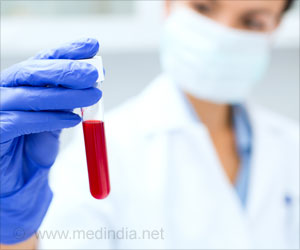Highlights
- Abnormal proliferation of cells cause cancer.
- Invasive procedures like scope and biopsies are used for detecting cancer which may be painful.
- Simple blood test that analyzes phosphorylated proteins can help to detect and monitor patient’s cancer.
The research was carried out using samples from breast cancer patients. However it can be used for detecting any type of cancer or other types of diseases. The research relies on the analysis of microvesicles and exosomes present in the blood plasma.
Protein Phosphorylation
The process of adding a phosphate group to a protein called protein phosphorylation may result in cancer cell formation. These phosphorylated proteins are known as phosphoproteins, and may be a prime cancer biomarker.
The scientists were not sure of the identification of phosphoproteins in the blood, as the liver releases phosphatase in the bloodstream which is capable of dephosphorylating the proteins.
Tao, said, "There are so many types of cancer, even multiple forms for different types of cancer, that finding biomarkers has been discouraging."
Presence of Phosphoproteins in the Blood Sample
The research team found nearly 2,400 phosphoproteins in blood sample and around 144 were significantly elevated in the cancer patients. The study was conducted by using 1-milliliter blood samples from 30 breast cancer patients, and 6 healthy controls.
The particles that are released from the cells may enter the bloodstream and play a role in intercellular communication. These are found to be involved in spreading cancer from one part to another in the body.
The team also identified that they are capable of encapsulating phosphoproteins using mass spectrometry.
Tao, said, "Extracellular vesicles, which include exosomes and microvesicles, are membrane-encapsulated. They are stable, which is important."
"The samples we used were 5 years old, and we were still able to identify phosphoproteins, suggesting this is a viable method for identifying disease biomarkers."
Benefits of Simple Blood Test
- Less invasive procedure than biopsy which removes tissue
- Helps to understand the effectiveness of the treatment
- Helps to monitor patients even after treatment to see if there is any recurrence.
The study findings were also found to be promising for the early detection of the cancer.
Ratliff said, "The vesicles and exosomes are present and released by all cancers, so it could be that there are general patterns for cancer tissues, but it's more likely that Andy will develop patterns associated with different cancers. It's really exciting."
"Early detection in cancer is key and has been shown to clearly reduce the death rate associated with the disease."
The author also plans to analyze the increased levels of phosphoproteins among various types of cancer to diagnose the type of cancer that the patient has.
The research company, Tymora Analytical, is also developing a technology which would allow doctors to place blood samples into a cartridge, and analyze the phosphoproteins that are present. This may eliminate the need for ultra-high-speed centrifuges which aren’t practical in clinical settings.
Interesting Facts on Cancer
- Cancer can affect any part of the body. There are more than 100 types of cancer.
- 70% of cancer deaths may occur in low and middle-income countries.
- 22% of cancer deaths can occur due to tobacco use.
- Chronic infections can cause one-fifth of all the cancers that occur in the world.
- Eating a healthy diet, following physical activity and limiting the use of alcohol and tobacco can prevent cancer.
- W.Andy Tao. et.al. 'Phosphoproteins in Extracellular Vesicles as Candidate Markers for Breast Cancer' Proceedings of the National Academy of Sciences, (2017); doi: 10.1073/pnas.1618088114
- 10 facts on cancer - (http://www.who.int/features/factfiles/cancer/facts/en/index9.html )
Source-Medindia














